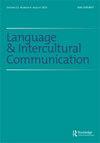民族主义是激励还是抑制?从中国日语学习者的角度解读复杂的身份动机关系
IF 2.2
1区 文学
0 LANGUAGE & LINGUISTICS
引用次数: 1
摘要
身份问题一直是语言学习动机研究的一个重点领域。然而,民族认同在语言学习动机中的作用并没有得到足够的重视。为了响应对民族主义和语言教育的及时反思,本研究探讨了政治民族主义和文化民族主义如何塑造中国学习者学习日语的动机。我们的分析表明,文化民族主义显著地促进了中国学习者的动机,而政治民族主义对动机的影响是两极化的。我们的研究有助于阐明根植的二语自我和国家兴趣在语言学习动机中的作用机制,特别是在中国语境下。本文章由计算机程序翻译,如有差异,请以英文原文为准。
Does nationalism motivate or demotivate? Unpacking complex identity-motivation nexus in the context of Chinese learners of Japanese
ABSTRACT Identity issues have been an area of focus in language learning motivation scholarship. However, the role of national identity in language learning motivation has not received sufficient attention. In response to the timely call for reflections on nationalism and language education, this study examines how political nationalism and cultural nationalism shape Chinese learners’ motivation to learn Japanese. Our analysis suggests that cultural nationalism considerably enhances Chinese learners’ motivation whereas the motivational impact of political nationalism is bifurcate. Our research helps illuminate the mechanism of the rooted L2 self and national interest in language learning motivation, especially in the Chinese context.
求助全文
通过发布文献求助,成功后即可免费获取论文全文。
去求助
来源期刊

Language and Intercultural Communication
Multiple-
CiteScore
3.00
自引率
47.40%
发文量
50
期刊介绍:
Language & Intercultural Communication promotes an interdisciplinary understanding of the interplay between language and intercultural communication. It therefore welcomes research into intercultural communication, particularly where it explores the importance of linguistic aspects; and research into language, especially the learning of foreign languages, where it explores the importance of intercultural perspectives. The journal is alert to the implications for education, especially higher education, and for language learning and teaching. It is also receptive to research on the frontiers between languages and cultures, and on the implications of linguistic and intercultural issues for the world of work.
 求助内容:
求助内容: 应助结果提醒方式:
应助结果提醒方式:


